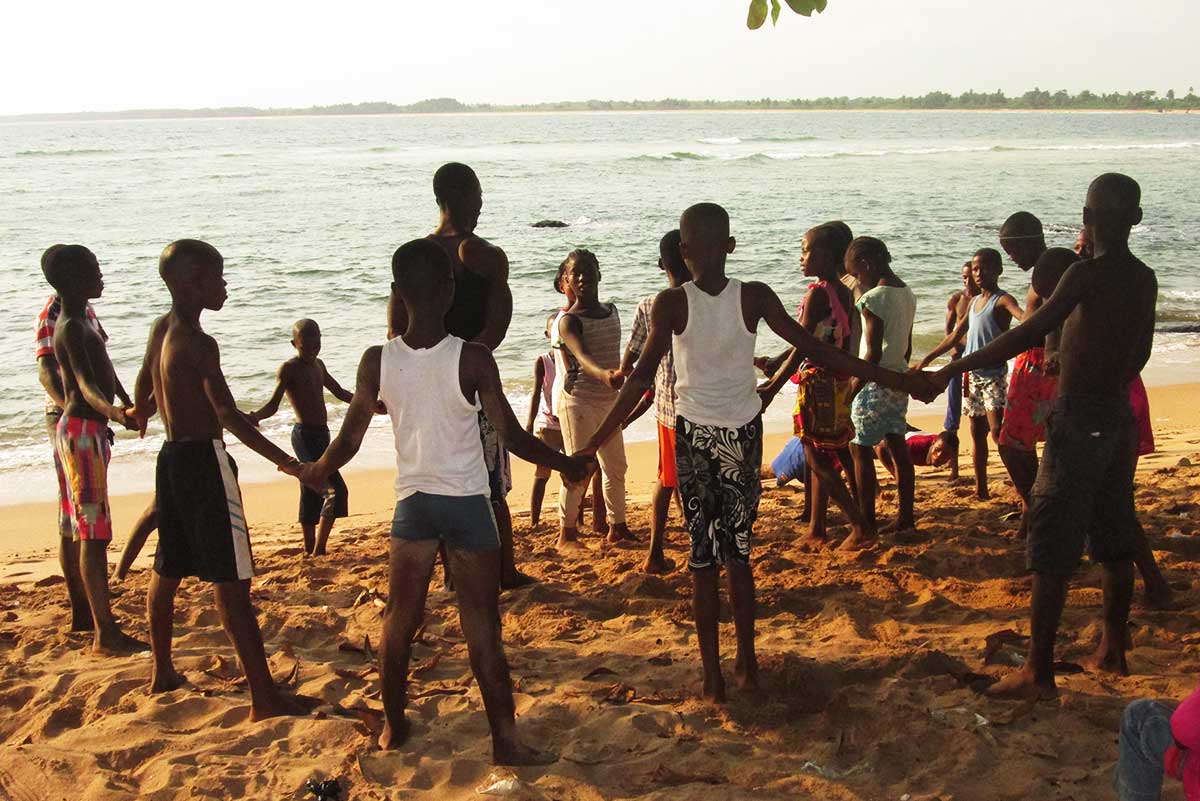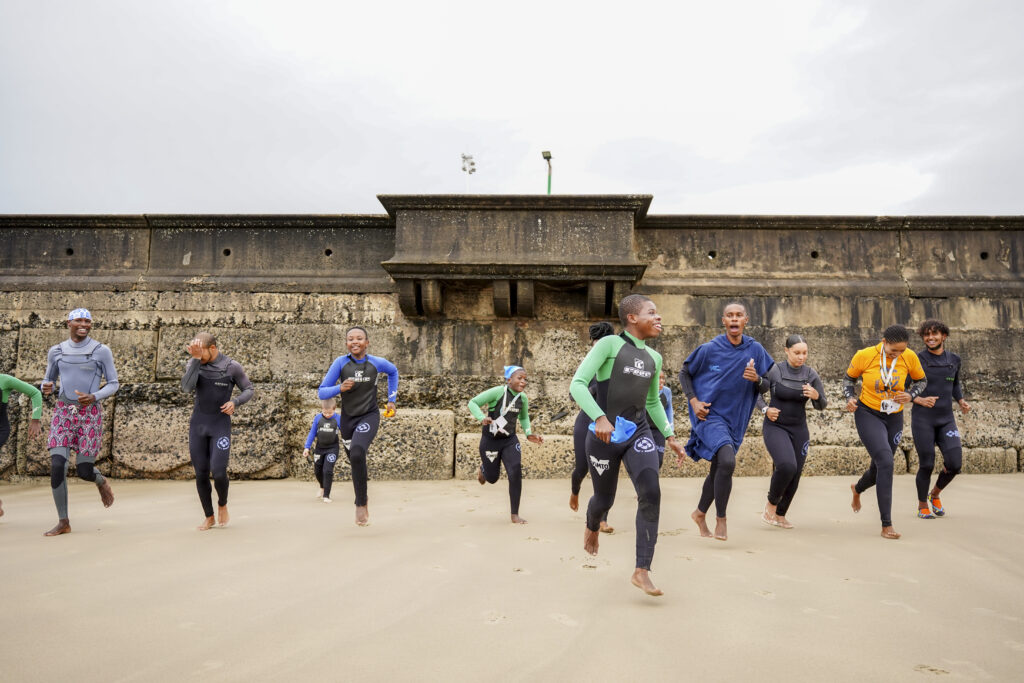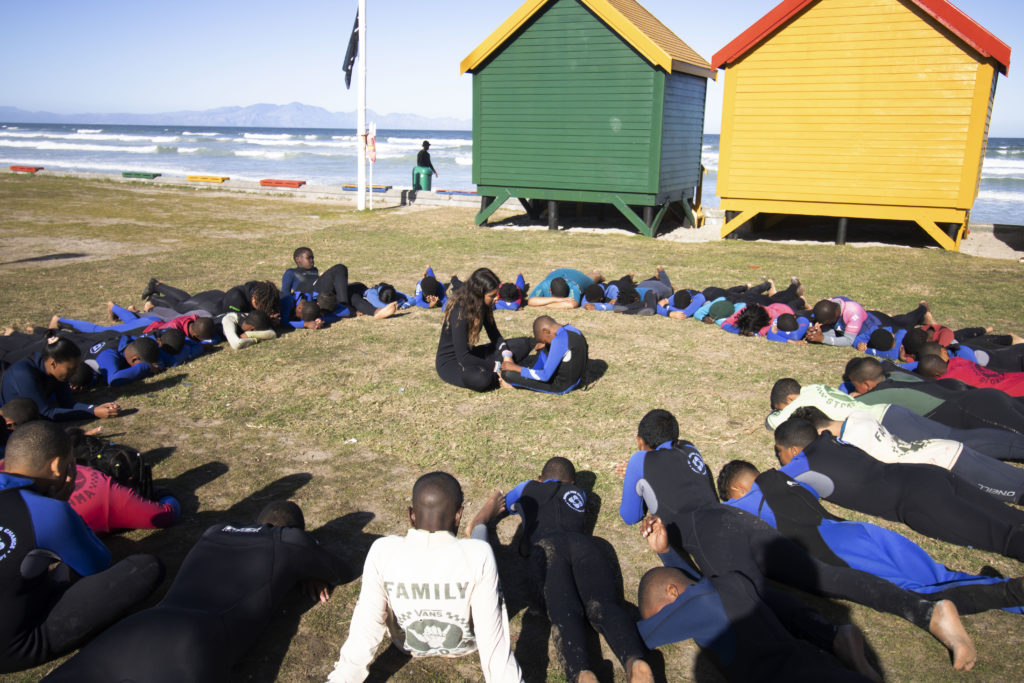Popping up in Liberia

[row]
[col span__sm=”12″]
“Being in the water, reflecting on the rolling sound of the waves, the kids express the relaxing feelings running through their mind. Their thoughts shift from the stress of daily assignments to the calming movement of the wave – the up and down – riding helping to soothe their anger, upset and stress.”
The aftermath of Civil War (1989-1996, 1999-2003) and a devastating Ebola epidemic (2014-2015), has left Liberia with the enormous task of rebuilding. Financial support from politicians and international donors has helped kick-start the repair process, but there still lies a long road ahead. One of the biggest issues is engaging youth. A youth who, in its short lifetime, has experienced such levels of trauma it is unimaginable for most to understand.
After successfully working for five years in challenging communities across Cape Town, Waves for Change were keen to see if their Surf Therapy programme – designed to help children cope with high levels of stress and trauma – could be applied in communities outside South Africa, where child mental health services are under-resourced and stigmatized.
At the end of 2016, Waves for Change were connected by Partners in Health, to students from Tubman University running outreach programmes in the southern town of Harper. The concept of Surf Therapy in a coastal town with no history of surfing, was of high interest to the students who were looking for new ways to engage local youth. With a population close to 18,000, Harper is slowly rebuilding post-Civil War and Ebola outbreak, but still lacks basic infrastructure; there is no central electricity or water supplies, and unemployment is rife resulting in a disenfranchised generation. The proximity of the ocean coupled with the obvious needs of the community, Harper proved the ideal location to pilot the first international Waves for Change site.
For the programme to run effectively, required support from community partners. Tubman University provided peer trained counselors and programme oversight; Partners in Health, gave strategic guidance, logistical support and on-site assessment; local churches provided equipment storage, a safe meeting place and helped with food preparation; whilst the Liberian surf community sent National Champions, Peter Swen and Melvin S. Kabahole Jr. to provide expert surf training. With a support system in place, a small team of six coaches led by the illustrious ‘Mr. Ross’ began delivering the first Liberian Surf Therapy programme.
[row_inner]
[col_inner span=”4″ span__sm=”12″]
[ux_image id=”9585″]
[/col_inner]
[col_inner span=”8″ span__sm=”12″]
Running after school from Monday to Thursday, the programme hosts between 60-80 children each day; they are divided in to four groups depending on age, ranging from nine to twenty years old. As with all Waves for Change sites, pre-tests are conducted at the start of each programme to provide a baseline for evaluation. Results showed all the children had experienced adverse childhood events of some sort; the biggest concerns were the high proportion of abuse from adults, the lack of food, lack of education, and exposure to death in the home. Over one third of the children revealed poor coping mechanisms, either pretending it didn’t happen, hiding or fighting. Over 15% revealed they didn’t have anyone to talk to.
[/col_inner]
[/row_inner]
[row_inner]
[col_inner span__sm=”12″ padding=”0px 0px 0 0px” margin=”0px 0px 0px 0px”]
Whilst these revelations are disturbing, they are conditions which the Waves for Change programme is specifically designed to address.
A typical day at Waves for Change will see children sign in before taking part in a physical warm-up to release energy and safely prepare them for the day’s activity. The physical warm-up is complimented by an emotional warm-up designed to encourage participation and sharing. Each lesson is built around a ‘teachable moment’ – a chance for the children to experience a specific
learning concept through the activity of surfing. Teachable moments include: ‘Immersion’ to foster connection and friendship; ‘Pair Surfing’ to teach sharing, trust and respect; ‘Check-In and Paddle Out’ to help overcome fear and anxiety; ‘Power Hand’ to learn how to calm down and reflect on strengths; and general mediation practice to help the children identify feelings and process stress. At the end of each session, coaches lead participants in a discussion about what they learned and how to apply it to their life at home, at school, and in the community.
[/col_inner]
[/row_inner]
[row_inner]
[col_inner span=”8″ span__sm=”12″]
Away from the beach, the Harper team invest significant amount of time conducting home visits, speaking to caregivers about their thoughts on the respective participant’s progress. The results following just six months are overwhelmingly positive. 75% of parents reported improvement in general behaviour and school performance. More significantly, 89% stated their relationship with their child had improved.
[/col_inner]
[col_inner span=”4″ span__sm=”12″]
[ux_image id=”9587″]
[/col_inner]
[/row_inner]
“He has goals for his future now and that is new for him. He says they swim, surf, eat and learn life skills. He wants to be a lifeguard when he grows up”
– Parent of participant
And the surfing? ‘Improving gradually’ replies Mr. Ross – cautious modesty when 95% of the older children are now paddling out and catching waves. But perhaps Mr. Ross’s feedback is reflective of a nation as a whole, modest in all its potential and cautious because history has been so cruel. Needless to say, with each session, the Waves for Change team in Liberia are gaining experience, building confidence and moving forward. The aim for the next six months is to graduate the programme from pilot phase to a permanent after-school fixture – teaching the next generation of surfers to ride the wave to a better future.
[/col]
[/row]
[row]
[col span__sm=”12″]
[ux_image id=”9588″]
[/col]
[/row]


